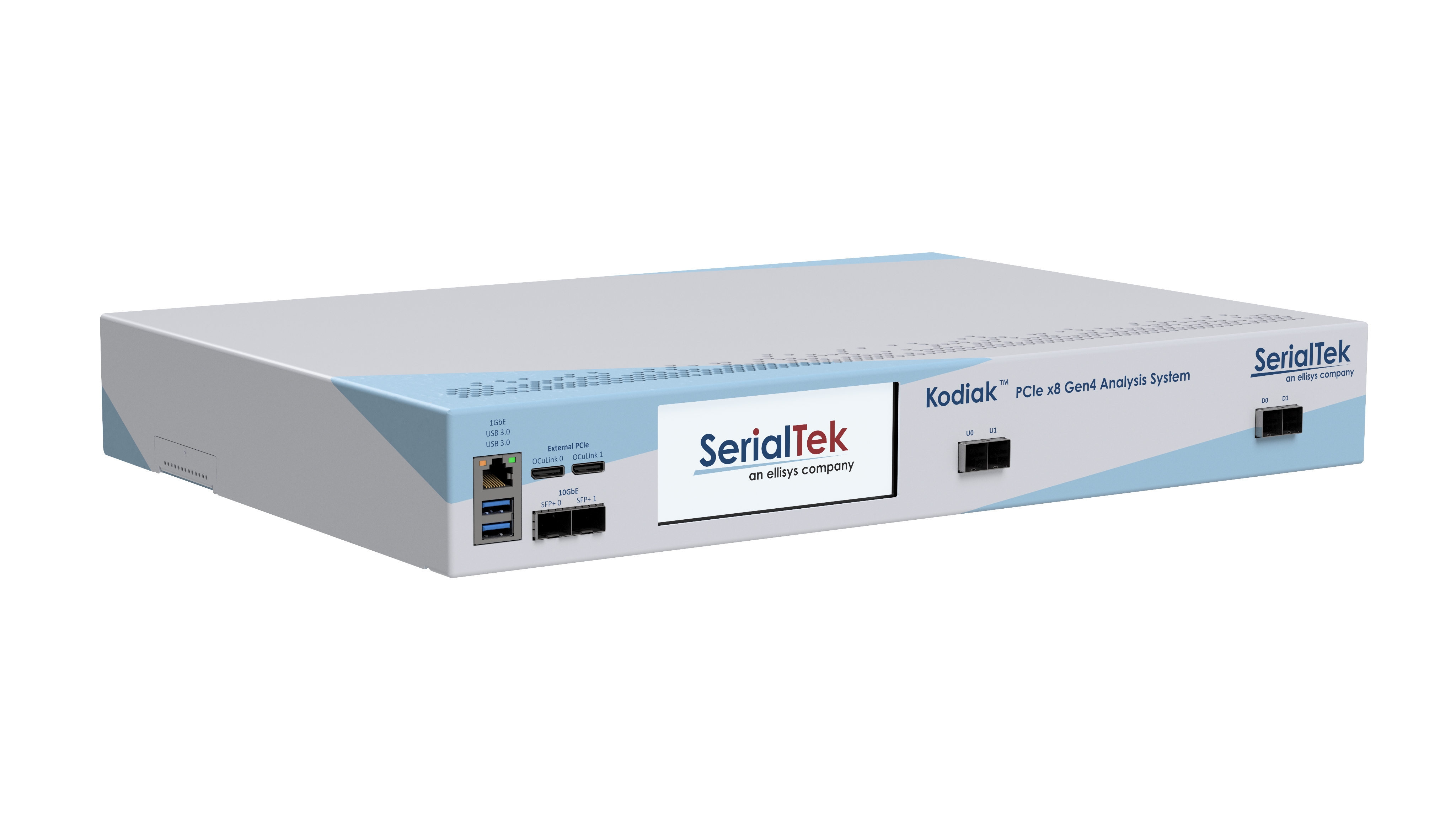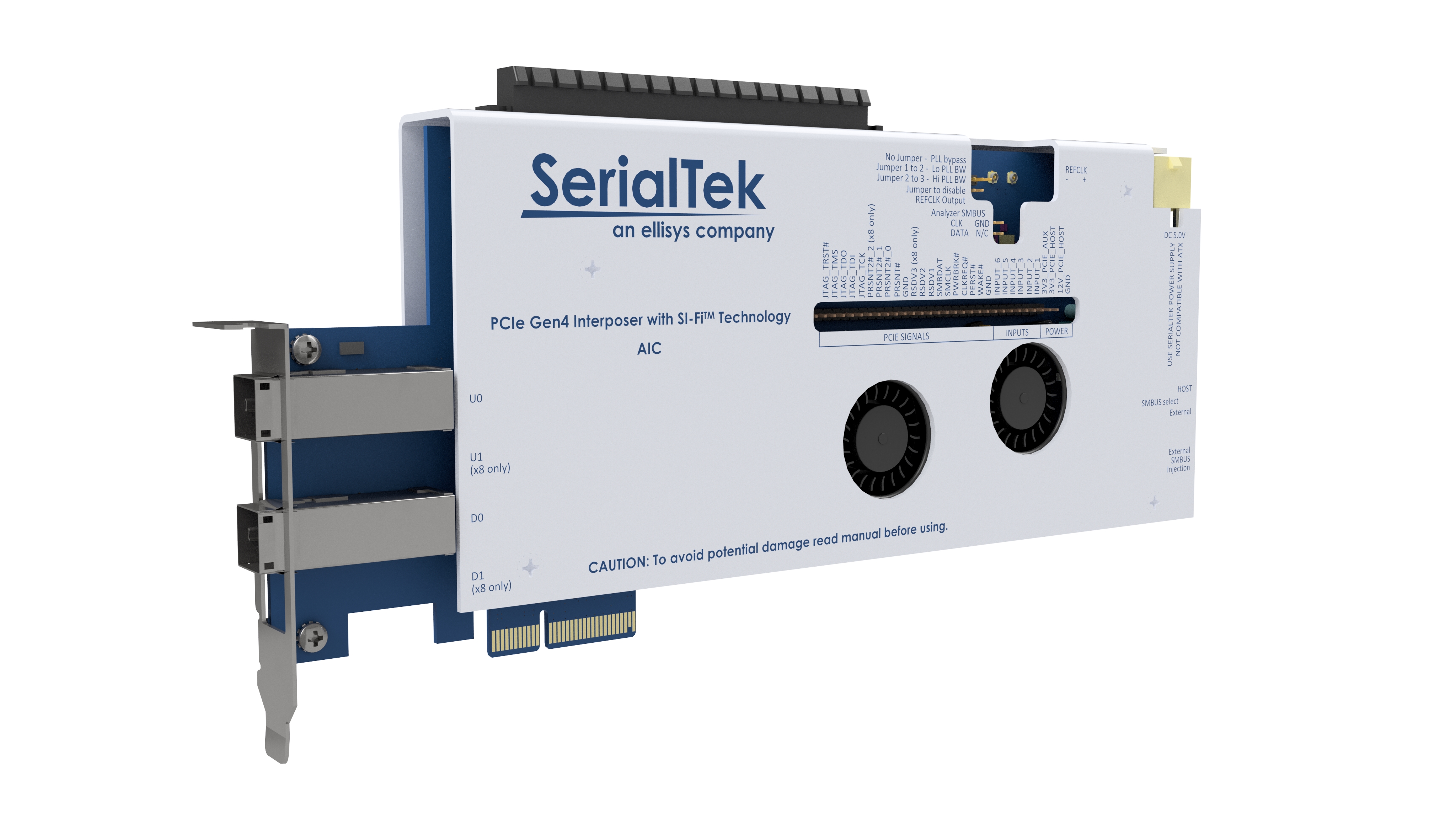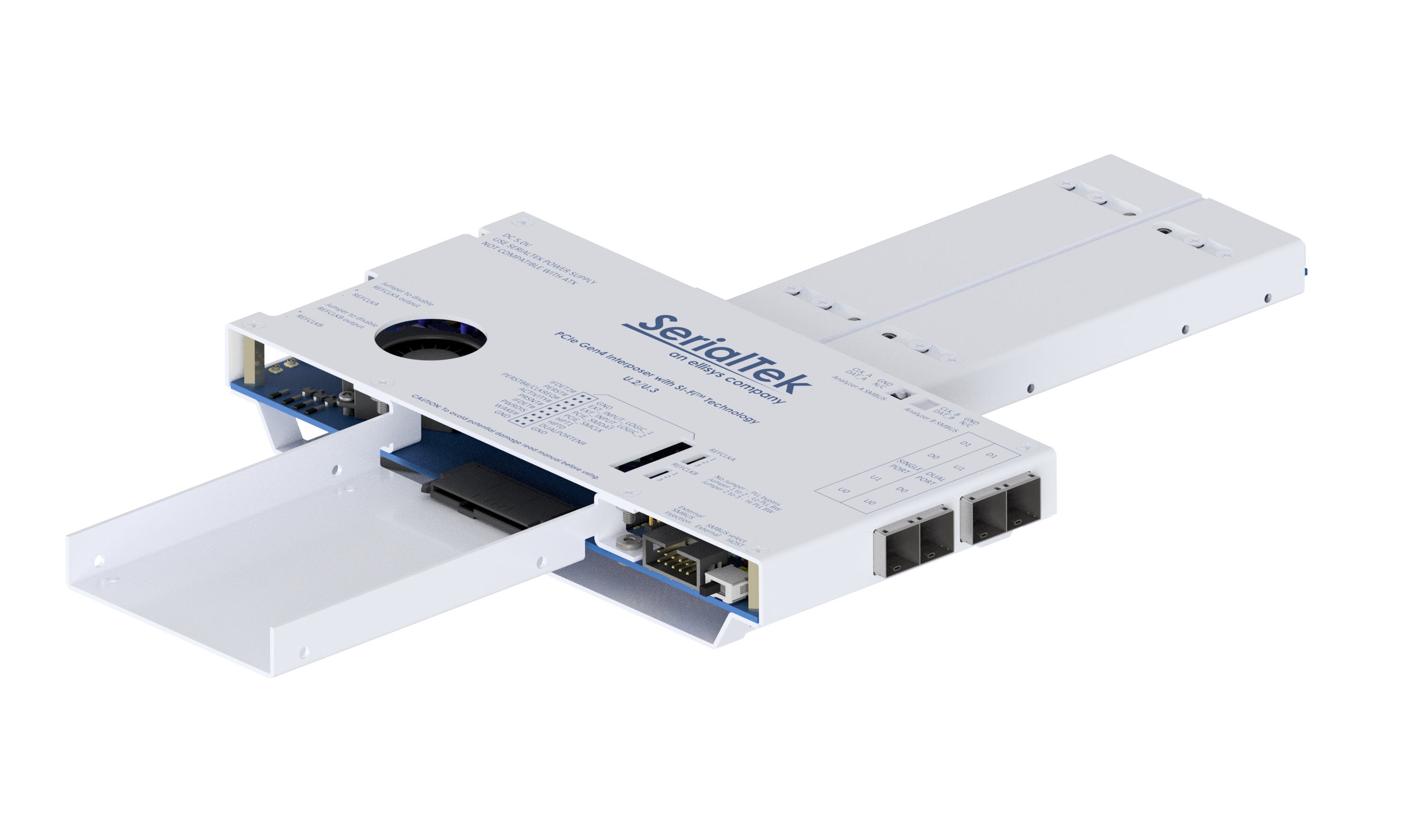SerialTek, a leading provider of protocol test solutions for PCI Express® (PCIe), NVM Express® (NVMe), Serial Attached SCSI (SAS), and Serial ATA (SATA), today introduced a major advancement in the PCIe/NVMe test and analysis market with the debut of its Kodiak PCIe/NVMe Analysis System. Coupled with the field-proven BusXpert™ analysis software, the Kodiak platform introduces an innovative, state-of-the-art design built to tackle the challenges presented by continual and rapid advancements in storage and datacenter I/O technologies.
Kodiak™ Next-Generation Gen4 PCIe®/NVMe™ Analyzer
Kodiak Brochure
PCIe/NVMe Analysis Platform with Embedded Hardware, Real-Time Protocol Processor™, Calibration-Free SI-Fi™ Probing and Automatic Equalization, Internal SSD Storage, Touchscreen LCD, and Standard PCIe Cabling.
State-of-the-Art Architecture
The Kodiak PCIe Gen4 Analysis System represents the state-of-the-art in protocol analyzer design. The Kodiak platform includes an array of high-performance innovations, made possible by an advanced design that breaks free from cumbersome legacy data upload practices in favor of ultra-responsive embedded data processing.
Interface responsiveness is markedly advanced, searches involving massive amounts of data are fast, and hardware filtering is flexible and powerful.
The Kodiak platform, with its field-proven BusXpert (TM) software application, is built to tackle the challenges presented by the complexities of rapidly advancing storage and datacenter I/O technologies.
Real-Time Protocol Processor
Kodiak employs an innovative system register processing concept called Real-Time Protocol Processor (RTPP™). This proprietary feature dynamically and automatically queries and saves PCI configuration space, host controller registers, and NVMe queues, whether the analyzer is actively recording or idle. This alleviates the need for time-consuming and highly impractical reboots, and provides the ability to precisely decode, trigger, and filter using current values.
Multiple Form Factor Support
SI-Fi™ interposer form factors include AIC (x4), M.2 (x4), U.2 (x4), and U.3 (x4). Additionally, U.2, U.3, single-port (1×4), and dual-port (2×2) analysis can be combined into one interposer unit, providing significant cost savings in enterprise environments where all form factors are required. SI-Fi™ interposers also support all relevant sidebands, including SMBus (e.g., NVMe-MI) from the host or from external / third-party injection or generation tools.
Flexible Trace Storage and Retrieval
Kodiak includes two 10GbE SFP+ ports and a GbE port to offload traces to a host computer or network and internal SSD trace storage of up to 2TB (with read-only access for other users). Direct attach storage choices include two USB 3.1 ports and two PCIe 3.0 OCuLink ports.
Transparency in Probe Design is Key
Driven by the need for ever-faster data transfers, PCI Express signaling has become exceptionally complex in design and difficult to monitor unobtrusively. Signal conditioning methods used for PCIe Gen1 and Gen2 now seem primitive compared to the complex approaches used for PCIe Gen3 and Gen4. Further challenges are presented by NVMe, which adds critical requirements like hot-plug and NVM Subsystem Reset (NSSR), where the PCIe signals are renegotiated. SerialTek’s proprietary SI-Fi™ technology directly meets and overcomes these challenges with the features and capabilities needed to work efficiently.
With SerialTek’s SI-Fi™ interposer technology, the transmitter threshold and pre-emphasis from one link partner reaches the receiver of the other link partner, so the link properly trains to optimum conditions, making the interposer as transparent as possible.
At the core of this technology is a highly specialized linear amplifier design where PCIe analog signals are received at a differential input and distributed to two separate phase-matched differential outputs with a nominal, idealized gain of 0dB. This approach results in easier set up of the analyzer and product under test and avoids a variety of limitations inherent to other probing approaches where link training sequences don’t pass through the interposer.
SerialTek’s SI-Fi™ interposer technology expands and enables coverage in critical test areas, including link training (LTSSM), Power Management, Hot Plug, Reset, and other situations where the physical link/lane characteristics may change.
No Need for Calibration
Competing PCIe Gen4 analyzers and interposers require tuning, or calibration, which leads to reliability issues as modern PCIe link training sequences can occur dynamically, not just at boot-up.
With SI-Fi™ technology and Kodiak’s adaptive EQ capabilities, users can save hours in setup time. And if the link characteristics change (e.g., Hot Plug or NSSR), Kodiak can follow those changes dynamically, ultimately saving your test.
Powerful SerialTek Features:
No tuning (calibration) required
– Kodiak’s Rx automatically equalizes (EQs) the PCIe signals at all data rates
– Kodiak’s Rx automatically equalizes (EQs) the PCIe signals at all data rates
Embedded trace processing architecture and fastest performance
Real-Time Protocol Processor
– Automatically captures PCI Config Space, Controller Registers, and NVMe Queues
– No boot trace needed
– Native NVMe triggers by device (BDF), Queues, and Packet/Event
– Native NVMe filters by device (BDF), Controller Registers, Queues, and Packet/Event
Deep Trace Buffers
– 36GB, 72GB, 144GB
Internal Trace Storage (SSD)
– 512GB, 1TB, 2TB
– Read-only access for non-primary users
Direct Attach Storage
– Two OCuLink (PCIe 3.0) ports
– Two USB 3.1 ports
Network and Direct Connectivity
– Two 10GbE SFP+ (optical/copper)
– One 1GbE RJ-45Single-port (1×4) and dual-port (2×2) analysis in one platform
Real-time access to traces in memory (prior to downloading)
– Users can review and analyze captured traces without downloading the trace
Touchscreen LCD for analyzer setup and status



.

